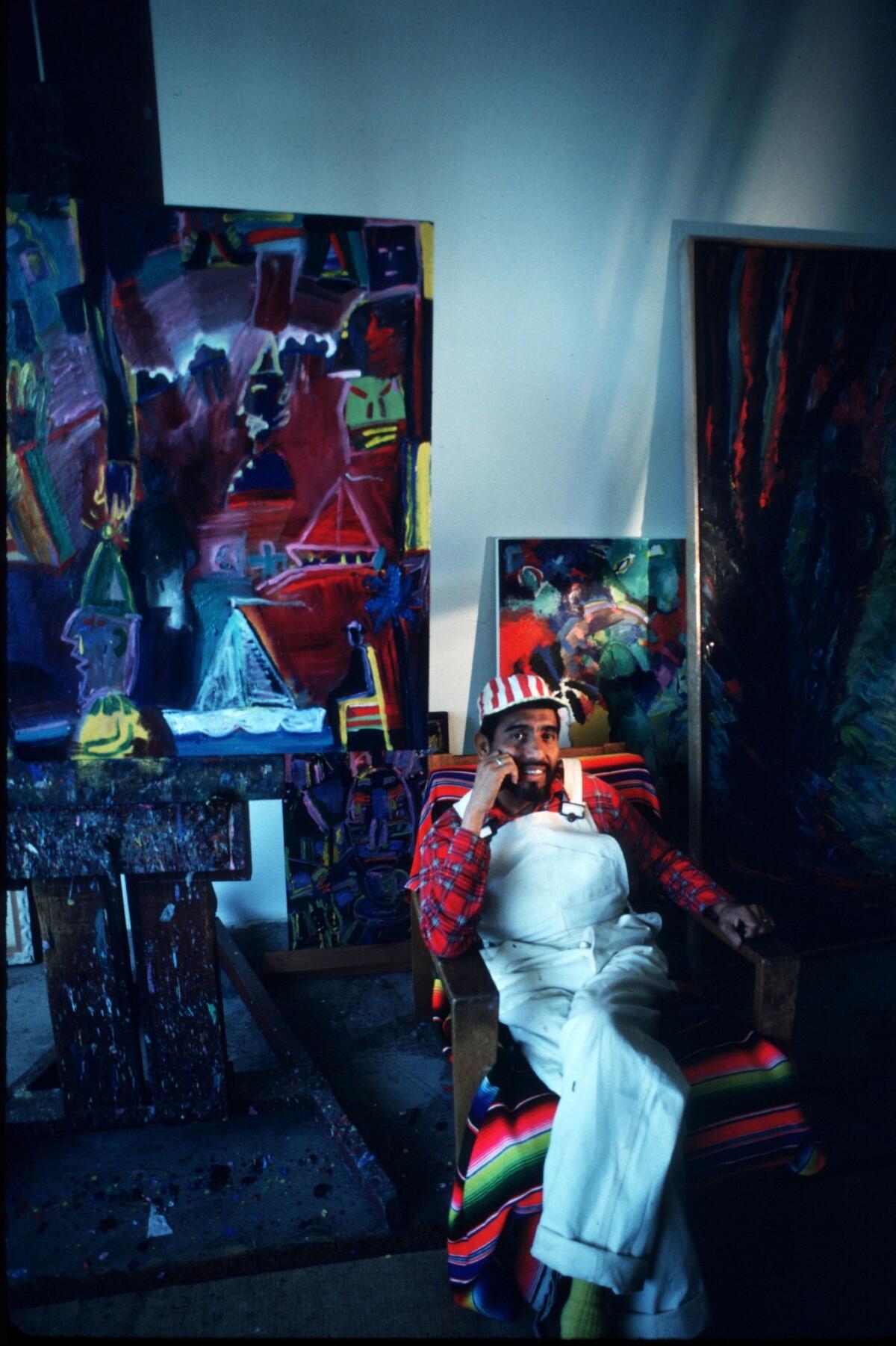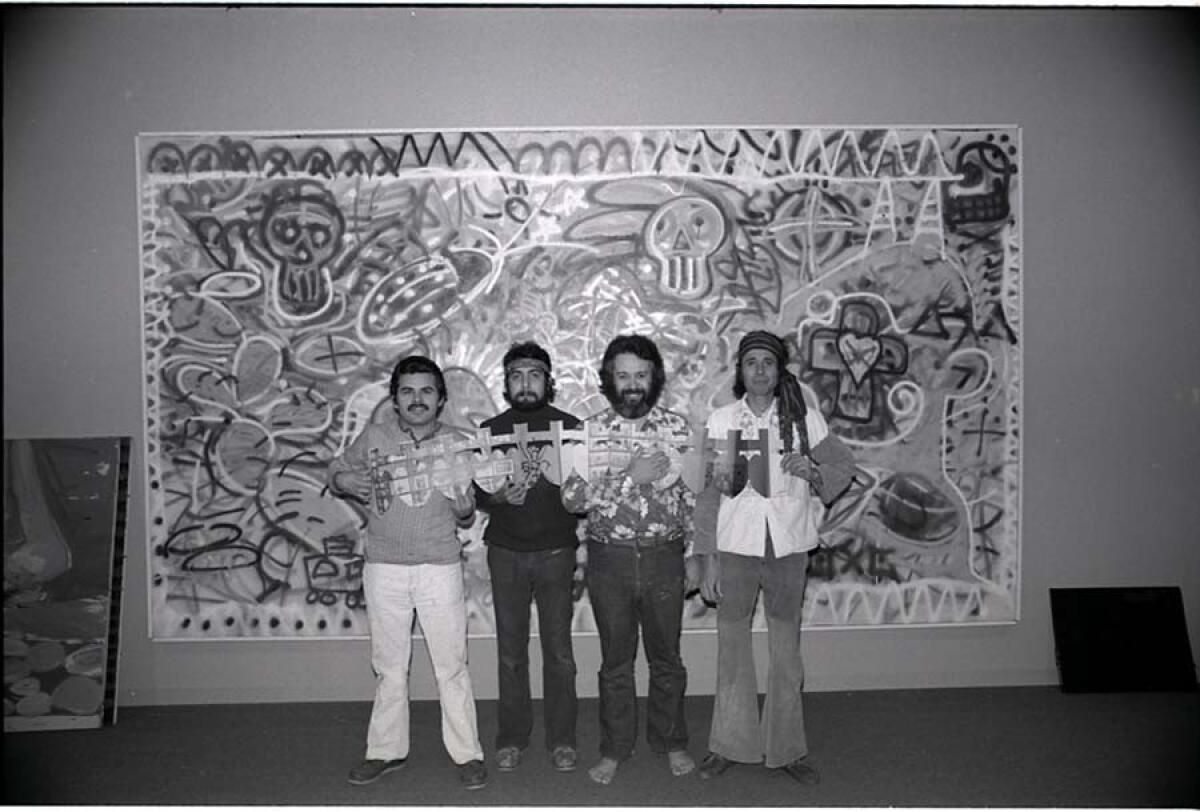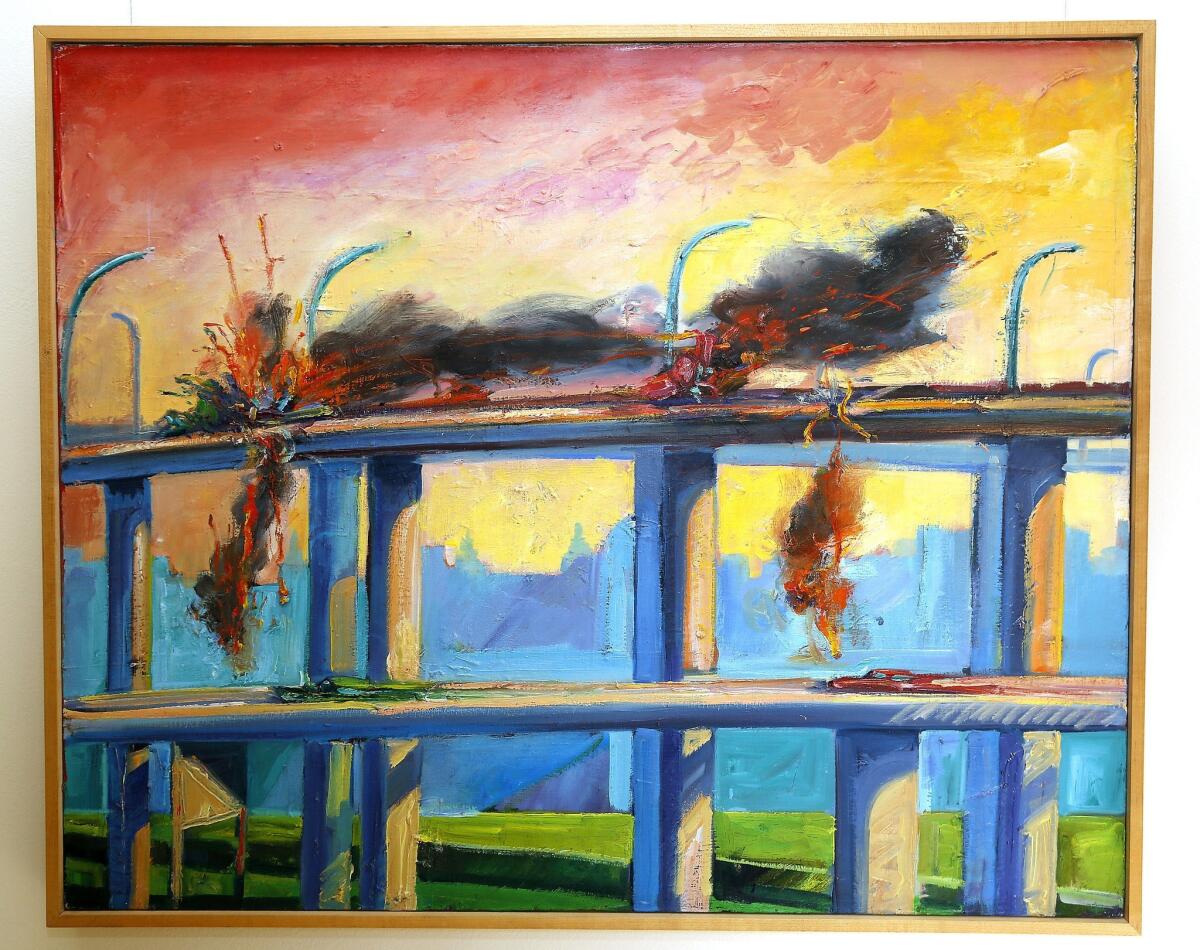Two boyhood friends, Dan Guerrero and Carlos Almaraz, and the documentaries about the history they’ve made
At the time, they were Eddie and Charles.
It was the mid-1950s in East L.A. Dan Guerrero was named after both his grandfather, Eduardo, and his famous father, Eduardo “Lalo” Guerrero, considered an early founder of Chicano music.
But he never felt like an “Eddie.” So when he left home, he took his middle name, Daniel.
Carlos Almaraz went by the English translation of his name.
They had a mutual friend, Ishmael Ramos, remembers Guerrero, who kept separately telling Eddie and Charles that they needed to meet, that they would really get along.
“I remember we were standing next to a chain-link fence in a grade-school playground, and he introduced us,” says Guerrero, now 79. “And we never saw him again. We dropped that poor boy like a hot potato.”
He laughs.
“As adults, one of us would suddenly say, ‘I wonder whatever happened to Ishmael Ramos,’” he says. “But that was it, [Carlos and I] were joined at the hip for the rest of our lives — or the rest of his life.”
On Oct. 26, the 10th annual OC Film Fiesta will screen their two documentaries.
“Carlos Almaraz: Playing with Fire,” a 2019 film by Almaraz’s widow Elsa Flores Almaraz and Richard Montoya about the late artist, will play first, followed by “¡GAYTINO! — Made in America,” a 2018 film adaptation of Guerrero’s autobiographical one-man show — about his life as a performer, producer and Broadway agent (who repped stars like Fran Drescher and a young Sarah Jessica Parker) — that he’s been performing since 2005.
It’s a rare opportunity to see the films back to back on the big screen.
In the Almaraz film, Guerrero is the childhood friend whose well-connected father took the two of them to meet his idol, Walt Disney. He’s the one who moved with him to New York as young adults after buying “New York on 5 Dollars a Day” in paperback. The one who always understood his artistic ferocity, his demons, his bisexuality, his alcoholism, his long history of destructive behavior — and how much it meant for him to finally find happiness in his career and family with Elsa in his later years.
In Guerrero’s film, Almaraz is his best friend who’s younger by a year but seems older because he “always knows everything.” The one who can’t keep a secret when Lalo Guerrero takes him out for a burrito and wants to know, once and for all, if his son is gay. The one who encourages him to get in touch with his Mexican heritage and introduces him to community members leading the Chicano civil rights movement of the 1960s.
“It’s so beautiful and interesting that these two young men both get to tell their story now, so many years later,” says Montoya. “One lives to tell the story — and still looks fabulous, by the way — and one tells the story with the help of his wife, his community and his friends.”

It’s been a five-year journey to complete “Carlos Almaraz: Playing With Fire.” Montoya, a performer and director most known for his work in the comedy troupe Culture Clash, had been talking with Flores Almaraz about creating a narrative film or opera inspired by her late husband’s passionate and complex life.
But they decided it made the most sense to start with non-fiction, to get his entire story on record in a film.
“[Carlos] was the generation of my father [poet José Montoya], also a Chicano artist, so I had always heard stories of him, but I had to meet him through footage and photos and stories,” says Montoya.

Much of the documentary’s voice over — narrated by Flores Almaraz, actor Edward James Olmos and Rage Against the Machine singer Zack de la Rocha, whose father, Robert “Beto” de la Rocha, was part of the Chicano art collective Los Four with Almaraz — was taken from Almaraz’s diaries.
The filmmakers also found a little-seen PBS affiliate interview with Almaraz from approximately 30 years ago, which they threaded through the film.
”Carlos was big, and his paintings were big, but they were also intimate at the same time,” he adds, explaining the film’s epic drone shots of Los Angeles and energetic Los Lobos music, which he says, for most of the film’s cast and crew, has been “the soundtrack of our lives.”

The “Playing with Fire” title came from the name of Almaraz’s first major retrospective at the Los Angeles County Museum of Art in 2017, which included more than 60 works from 1967 to his AIDS-related death in 1989.
“Carlos would get so close to the flames and the heat,” says Montoya, “but the calamity, the crisis, the fire, the explosions that Carlos was dealing with always had a little bit of humor and wonderment. We like to think of Carlos as this flame, this fire — and we keep the flame burning, we keep this guy alive, by hopefully making the most beautiful film we can.”
Making sure future generations understand Almaraz’s enormous contributions to both the fine art world and the Chicano movement is also why Guerrero made “¡GAYTINO!”
“I really wrote it very much to celebrate Carlos and my dad, those two huge figures in my life,” he says.
He also wrote it to educate viewers about Chicano history and specifically Latino LGBTQ history.
Though Guerrero has been performing “¡GAYTINO!” for over a decade, he had only made minor tweaks to the script, that is until the “political climate took a drastic change.” So he recently added the tag “Made in America.”
“Playing with Fire’s” tagline also emphasizes that Almaraz is a “painter, poet, American master.”
Guerrero also added two more stories about his father — one about how after receiving the National Medal of Arts at a White House ceremony at 81 in 1996, alongside Edward Albee, Robert Redford and Stephen Sondheim, Lalo Guerrero told the NBC Nightly News that despite being born in Tuscan, Ariz., this was the first time he felt like an American — and another about his father’s last days.
“He was frail and fragile, yet he still wanted to know what was coming up,” says Guerrero, “which ties to Carlos, because the day he died, he was still saying ‘Let’s work on this!’ They were these creative spirits.”
Guerrero thinks having these two screenings together at OC Film Fiesta is “very poetic and very sweet.”
“I’m thinking, aw, Charles and Eddie are back together again,” he says.
IF YOU GO
What: “Carlos Almaraz: Playing with Fire ” and “¡GAYTINO! - Made in America” at the OC Film Fiesta
Where: AMC Orange 30, 20 City Boulevard West, Orange
When: Oct. 26; “Playing with Fire” at 2:30 p.m. and “¡GAYTINO!” at 4:30 p.m.; Elsa Flores Almaraz, Richard Montoya and Dan Guerrero scheduled to give Q&As after their respective screenings
Cost: $10 a screening; $5 for student, teachers, Santa Ana residents, military and veterans
Information: (888) 906-0340; masamedia.org/ocfilmfiesta2019
All the latest on Orange County from Orange County.
Get our free TimesOC newsletter.
You may occasionally receive promotional content from the Daily Pilot.




